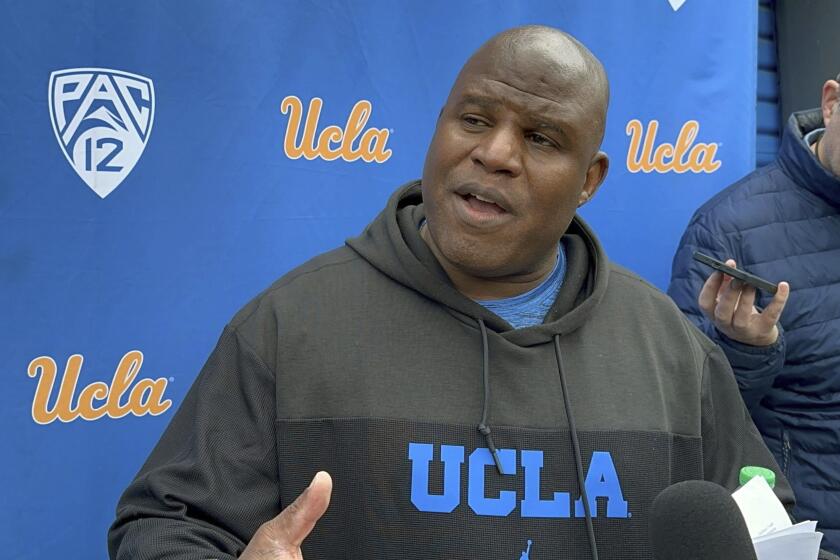Players Give Way to Prayers
During close games at Houston’s Compaq Center, basketball and hockey fans did their share of praying. Next spring, the stadium will hear some serious hallelujahs.
After a 14-month, $75-million renovation, the Compaq Center will reopen as Lakewood Church, the nation’s largest house of worship.
With 16,000 seats, two waterfalls and an interior camera ready for Sunday broadcasts, the reborn structure dovetails national trends that promise to shake up the economics of urban real estate: the increasing number of obsolete sports stadiums and the meteoric growth of huge religious congregations that need “megachurches.”
Requiring arena-sized seating and vast parking lots, these churches are expensive to build and demand large plots of land that are difficult to come by in urban areas. That has made rejected sports arenas, faced with demolition, fertile ground for religious conversion.
It may be a commercial real estate boomlet in its infancy. Besides the Compaq Center, only the Forum in Inglewood has made the jump, now drawing about 6,000 on Sundays as the Faithful Central Bible Church. (The church moved in before all the Forum’s event contracts had been fulfilled, so in the early days worshipers shared space with the Women of Wrestling league.)
But interest appears to be growing. Joel Osteen, the 41-year-old pastor of Lakewood Church, said half a dozen pastors from around the country had asked him how he went about signing the 30-year, $12.3-million lease on the Compaq Center.
Church leaders, he said, realize they have to be inventive these days.
“You have to change with the times,” he said. “If Jesus were here he’d change with the times. He couldn’t ride around on a donkey. He’d drive a car.”
In the last 10 years, 20 arenas have been built to replace National Basketball Assn. teams’ aging homes, according to the league, and some of the old stadiums are vacant or underused.
As the new generation of sports facilities has sprung up, the megachurch -- defined as any with more than 2,000 worshippers -- has flourished.
In 1970, there were 10 megachurches in the U.S. Today there are an estimated 850 non-Catholic megachurches, with four of the six largest in Texas, said John Vaughan, director of Church Growth Today, a think tank in Bolivar, Mo., that publishes an annual listing of the world’s largest and fastest-growing churches. He said the survey didn’t include Roman Catholic parishes because there weren’t enough Catholic data.
For years, the Houston Rockets called Compaq Center home, and the team paid $100,000 a year in management fees to the city. But team leaders were itching for a building that had a separate practice area, a restaurant, more luxury suites, ample parking and nicer locker rooms.
In 1997, voters approved a 2% hotel tax and 5% car rental tax to be used for sports complexes, spawning the glitzy Toyota Center. The $235-million downtown facility, which also houses the Houston Aeros minor league hockey team and the Houston Comets of the Women’s National Basketball Assn., opened in October with an inaugural concert by Fleetwood Mac.
“We doubled the rent we received,” said Dawn Ullrich, Houston’s director of convention and entertainment facilities. “We put $20 million to purchase the land and prepare the site for construction. In exchange for that we have $200,000 a year in naming rights payments, a suite and 20 dates a year we can use for nonprofit events.”
In the last four years, Houston voters have approved two other facilities, and the city of Houston and surrounding Harris County have reaped the rewards from Minute Maid Park and Reliant Stadium.
“We can now host certain events we would not have been able to host before, like the Super Bowl,” said Oliver Luck, chief executive of the Harris County-Houston Sports Authority. This month “we’re hosting the baseball All-Star game at Minute Maid Park. We’re doing the NCAA Final Four at Reliant in 2011. Hotels fill up. People spend money.”
Lakewood Church won’t be the economic engine for the area that the old stadium was, but the county is getting something out of it: $12.3 million upfront for the lease, according to Lakewood spokesman Don Iloff.
For Lakewood, the move to the old Compaq Center next April (just in time for Easter services) will give it celestial bragging rights of sorts.
Already the fastest-growing congregation in the country with more than 30,000 members, Lakewood in its new home will eclipse the 27,000-member Crenshaw Christian Center of Los Angeles as the biggest church in the nation -- 16,000 seats versus 10,000 or so at Crenshaw Christian Center’s landmark FaithDome.
The Rockets’ old locker room is becoming a nursery. A swath of stadium seating has been torn out to make room for the waterfalls that will bookend the 200-person choir. And a state-of-the-art hydraulic stage is being built for the choir and the nine-person band, which features an electric guitar but no organ.
Osteen tends to his global flock with broadcasts on ABC Family, Pax TV and BET, reaching more than two dozen of the largest television markets in the country, as well as far-flung spots that include Estonia and Cyprus.
The Compaq Center’s 20 luxury suites have been turned into electrical rooms from which Lakewood’s 25-person production team will operate lighting, curtains and cameras. It is, Osteen admits, a service conceived to lure and retain a generation of worshippers who want their Bible-based inspiration served up in an entertaining package.
There are some sports venues that have been discarded by pro teams but have yet to be made over as megachurches. Houston’s multipurpose Astrodome, for example, sits vacant.
“It’s a 60,000-seat building that’s very sound,” Luck said, “but I don’t know if there’s a church that needs that much space.”
Lakewood’s Osteen isn’t so sure. “I think there could be a day when we see 75,000 [congregants] instead of 25,000,” he said. “I think there’s that potential.”
More to Read
Go beyond the scoreboard
Get the latest on L.A.'s teams in the daily Sports Report newsletter.
You may occasionally receive promotional content from the Los Angeles Times.










